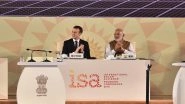Islamabad, April 3: Pakistan is in economic crisis amid rising inflation and cost-of-living as successive governments and central bank governors have spectacularly failed in taming inflation over the last three decades, reported The News International.
The lack of coordinated fiscal and monetary policy responses, coupled with the complete inability of the central bank to keep inflation within the target range has led to a scenario where the country is on the verge of a hyperinflationary cycle. Pakistan Economic Crisis: Pakistani Citizen Praises PM Narendra Modi, Says 'Friendship With Indian Prime Minister Will Boost His Country’s Conditions' (Watch Video).
Inflation for March 2023 clocked in at 35 per cent, which is amongst the highest-ever levels. For the more vulnerable segments, inflation is close to 50 per cent, as food prices spiral out of control, reported The News. Pakistan Economic Crisis: Pakistanis Urged To Drink Less Tea To Reduce Import As Country Grapples with Soaring Inflation.
The disaster is playing out against the government's slow haste to clinch a staff-level-agreement (SLA) for the resumption of a stalled International Monetary Fund bailout.
Notably, high inflation levels are fuelled by the continued slide of the rupee and unprecedented high food inflation. The households depending on wage earners, and salaried individuals - whose real earnings have been on the decline for the last several years despite (any) nominal raises because of the rupee depreciation - are the hardest hit by economic hardship.
In other words, the cost-of-living crisis gripping the lower-income strata of society has assumed the proportions of a full-blown disaster, unmitigated by the precious little the government has been able to do to address it, reported The News.
A lazy excuse of policymakers both on the fiscal and monetary side is blaming a commodity super cycle for any price increases, while completely ignoring the catastrophic decisions that fueled inflation, some of which include incessant obsession with disrupting supply chains (thereby leading to shortages) - and by racking up debt to bridge fiscal deficits that are a function of bad governance and inability to expand the taxation net.
Moreover, as tax collection can't even keep pace with inflation, the deficit is only bound to increase further, which means the state is going to borrow more to bridge the ever-increasing deficit, reported The News.
The evolution of inflation during the last few quarters can be traced back to the surge in commodity prices globally, which led to a completely absurd decision to subsidize fuel prices, effectively encouraging consumption when prices are increasing.
Precious foreign exchange reserves were spent without taking into consideration strong signals indicating a global monetary contraction, which would not just increase the cost of funding for Pakistan but also make access to debt more difficult, reported The News.
As foreign exchange reserves dropped significantly, the policymakers trying to outdo their earlier not-so-smart manoeuvres started rationing foreign exchange reserves, thereby restricting the availability of the same for the import of raw material or intermediate goods, etc. This had a snowball effect as that disrupted supply chains across all industries.
As industries lost access to imports, they started reducing production and eventually shutting down, increasing unemployment. The inability to import animal feed, or seeds, or other critical inputs led to a cascading effect on the food supply chain. Even though the global commodity surge cooled down, disruption of the local supply chain resulted in shortages, which fueled inflation, reported The News.
Instead of fixing supply chains, the government further reallocates capital towards subsidized food and handouts, further leading to depravity and more recently loss of human life due to ill-planned, and often selfish manoeuvres.
Meanwhile, as food inflation continues to increase unabated and may stay elevated given the complete breakdown of supply chains, another round of inflation due to an increase in wages will follow.
Policymakers on all sides of the policy spectrum have failed the country's people. Their inability to accept they have failed will lead to further disaster. There is no course correction that is being worked out, nor is there a captain of the ship to steer the course, reported The News.
All in all, the government doesn't seem to realize that it is running out of time to avert a cost-of-living disaster that has the latent potential to spark violent upheaval.
(The above story is verified and authored by ANI staff, ANI is South Asia's leading multimedia news agency with over 100 bureaus in India, South Asia and across the globe. ANI brings the latest news on Politics and Current Affairs in India & around the World, Sports, Health, Fitness, Entertainment, & News. The views appearing in the above post do not reflect the opinions of LatestLY)













 Quickly
Quickly


